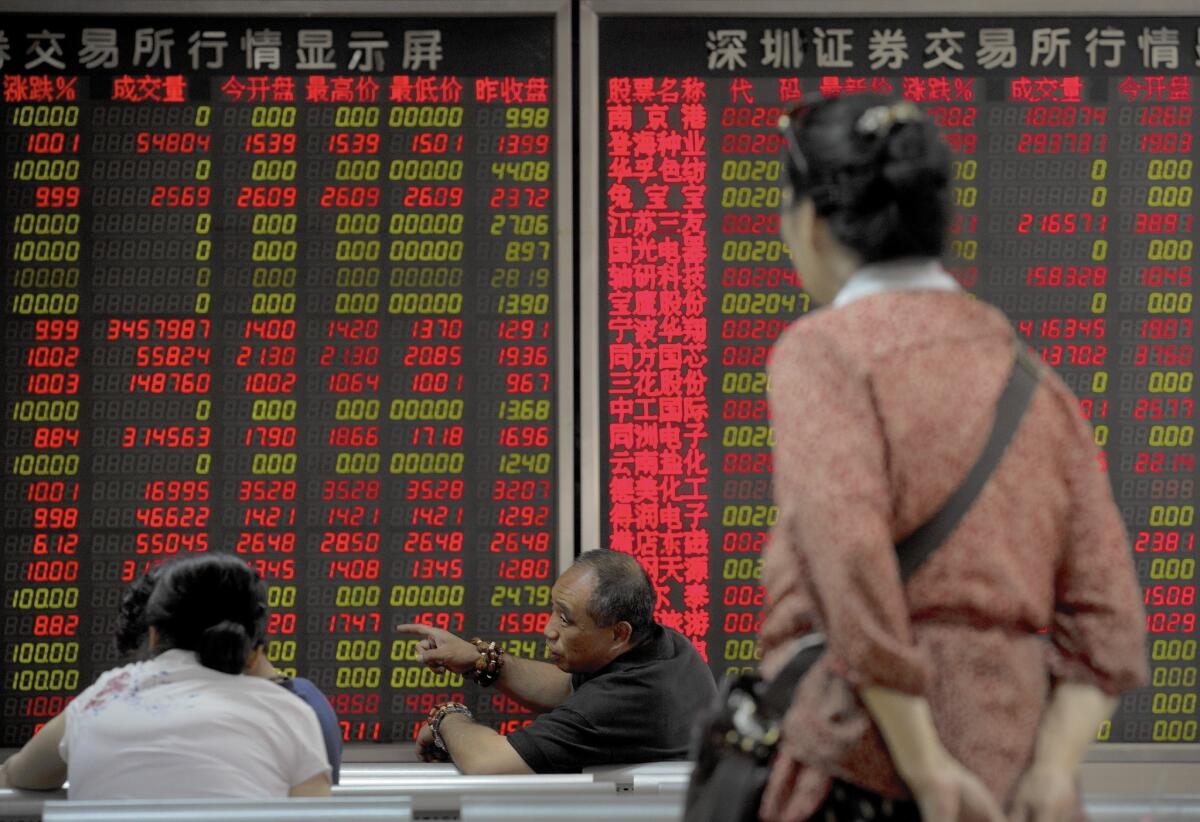China’s response to a stock market plunge? Censor, spin, restrict selling

Chinese investors chat while monitoring stock prices at a brokerage house in Beijing on July 13.
Chinese President Xi Jinping has positioned himself as a champion of fiscal reform. In July 2013, he announced that “China’s prosperity should be reliant on the real economy, not on bubbles.” Many people trusted his leadership so much that in June 2014, when the country’s stocks began to rise, Internet users spoke of an “Uncle Xi bull market.”
As it continued to rise, it began to look more like a bubble.
Then last month, when the stock market plunged, so did widespread hopes that Xi would deliver on his promises. From June 12 to July 8, the country’s two main markets, in Shanghai and Shenzhen, dropped by about 30%, shedding more than $3 trillion in value, more than France’s entire stock market. Authorities introduced panicky measures to stop the slide: They provided massive loans for buying, dramatically restricted selling, and censored negative sentiment in the media and online.
These measures appear to have eventually gained traction; the Shanghai Composite has recovered 13.2% over the last three trading days. Yet analysts say the episode underscores the precariousness of China’s economic growth — and by extension, the credibility of top authorities, even Xi himself.
“We’re certainly not out of the woods,” said Fraser Howie, coauthor of “Red Capitalism: The Fragile Financial Foundation of China’s Extraordinary Rise.” “The index is no longer falling, but that’s only part of the story. The real story is the government response, and the integrity of the market.”
Xi has spent the first two years of his tenure cracking down on corruption, aggressively pursuing Chinese territorial claims in the South China Sea and dramatically tightening the reins over freedom of expression and civil society.
So last year, when the Communist Party encouraged people to plow money into stocks — and loosened borrowing restrictions, making it easier to invest — millions of people took heed. The Shanghai market grew more than 150% in a year, peaking on June 12, even though China was experiencing its slowest overall economic growth since the global financial crisis in 2009.
The Communist Party mouthpiece People’s Daily declared in a commentary that the Shanghai index surpassing 4,000 index points on April 10 was “merely the start of a bull market.” The author, Wang Ruoyu, called shares in mainland-based companies “bearers of the Chinese dream” — a slogan attributed to Xi.
“I thought Xi was serious about [avoiding bubbles],” said Andy Xie, an independent economist in Shanghai and former chief Asia Pacific economist for Morgan Stanley. “Somehow, it’s all gone counter to what he said. It’s almost as if he’s not in charge of the economy.”
Although the market took a dive, even at its nadir last week the Shanghai index remained about 75% higher than it was at the same period last year. The government forcefully intervened anyway.
Within the last few weeks, authorities have halted trading for half of the companies on the market and banned large shareholders and executives from selling off stock for six months. Interest rates were slashed to a record low of 4.85%. A state-backed finance company lent large Chinese brokerage firms $42 billion dollars to buy blue-chip stocks.
When the slide continued, the government employed strategies it often uses to quash dissidents, protests and other perceived threats to social stability. State media accused “hostile foreign forces” of “malicious” short-selling. Censors scrubbed social media sites of the term “stock market crash.”
The country’s media regulator issued orders that all radio and television stations “substantially cut down on coverage of the stock market,” according to a leaked circular posted online by the website China Digital Times. “Do not conduct in-depth analysis, and do not speculate on or assess the direction of the market,” it said.
“I think this is the most serious crisis facing Xi since he came to power,” Willy Lam, an expert on elite Chinese politics at the Chinese University of Hong Kong, said in a speech in Vancouver, Canada, on Thursday. “It will require a lot to restore people’s confidence in the regime.”
Xi has not publicly commented on the situation. Premier Li Keqiang was quiet until July 2, when he tried to ease fears that the plunge would imperil the government’s reform efforts. Authorities will “cultivate a capital market and monetary market of openness, transparency, and continuous, stable and healthy development,” he said.
According to state media, China has 90 million stock market investors. Many were drawn to the market by positive state media coverage. They invested heavily this spring as the market began to peak, and lost small fortunes in the plunge.
Although censors have quickly scrubbed Chinese websites of highly critical remarks, black humor has proliferated on the popular microblogging service Sina Weibo, a barometer of widespread discontent. “Last month, my dog ate what I ate. Last week, I ate what my dog ate. This week, I ate my dog,” said one widely shared joke, posted in the third week of precipitous declines.
Some young investors say they will continue to invest in the stock market.
Kira Sun, a 24-year-old clerk in property financing, said that he entered the market in November 2013 with about $48,000. His investment peaked at about $150,000 this May, before he lost about a third of that. He’s still nearly $50,000 ahead.
“I don’t believe any financial crisis will take place in China in the near future,” he said. “The bull market will definitely continue.”
Times staff writer Jonathan Kaiman contributed to this report from Jakarta, Indonesia, and special correspondent Harvard Zhang from Beijing.
More to Read
Start your day right
Sign up for Essential California for news, features and recommendations from the L.A. Times and beyond in your inbox six days a week.
You may occasionally receive promotional content from the Los Angeles Times.


